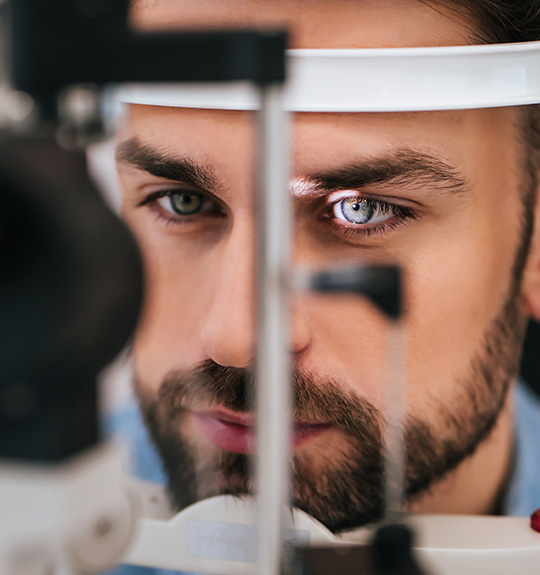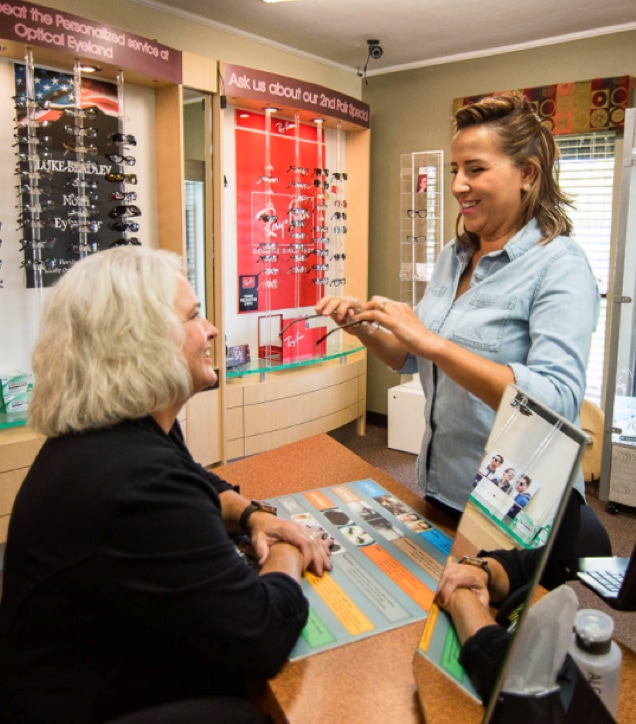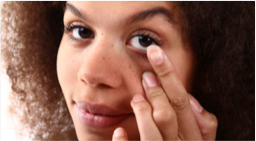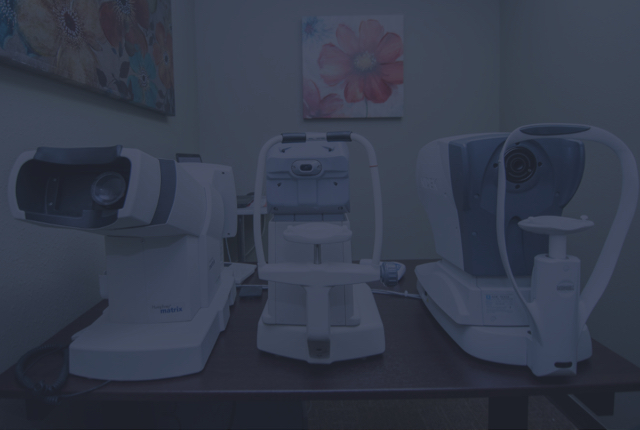- Apopka, FL
- 407-880-0335

Emergency Eye Care in Apopka
Book AppointmentWe’re Here When You Need Us Most
Nearly 2.5 million eye injuries occur every year, with 50,000 of those resulting in permanent vision loss. Approximately half of these injuries occur at home, and almost 800,000 are work-related.
The eyes are sensitive and surrounded by delicate tissues that require special care and attention. If you’ve sustained an injury or experiencing symptoms like swelling, redness, or pain in your eyes, call us immediately for an emergency eye appointment.

An eye emergency can include a range of conditions, each with its own symptoms and complications. Call us if you experience any of the following:
- Changes in vision
- Decreased or loss of vision
- Double vision
- Light sensitivity
- Sudden intense pain and redness in the eye
- Burning or stinging in the eyes
- Pupils that are not the same size
- One eye not moving the same as the other
- One eye bulging out
- Bruising around the eye (black eye)
- Bleeding from the eye
- Blood in the sclera (whites) of the eye
- Discharge from the eye
- New or severe headaches
If you’ve received an injury to the eye and have sudden vision loss, swelling, bleeding, pain, or onset of floaters or flashes, call us immediately or visit your nearest emergency room if we’re unavailable.
Common Types of Eye Emergencies
Even the most seemingly minor injury can lead to long-term complications. It’s important to recognize when you’re experiencing an eye emergency so you can take the proper steps to protect your eyesight.
If you’re struck in the eye, like from a ball or a fist, you may have damage to your eyelid, eye, or surrounding tissue. This can sometimes result in a black eye or a swollen eyelid, but you may also notice bleeding in the eye or sclera.
A bad hit may even break the bones around your eye.
If you get hit in the eye:
- Gently apply a cold compress to reduce swelling and pain. Do not apply pressure.
- Don’t use food items that may introduce bacteria into the eye.
Even a light blow to the eye area could result in a significant injury. If you notice a visual disturbance or develop a black eye, give us a call so we can rule out potential complications.
The cornea is the clear dome on the front of your eye. Sometimes, it can get scratched, like from a fingernail, pet, or even dirt. While minor scratches will likely heal on their own, we recommend always seeing your optometrist for any corneal abrasion. This will help you avoid further complications, such as infection.
If you’ve scratched your cornea:
- Rinse your eye with saline solution or clean, cool water.
- Do not rub or touch your eye.
- Remove your contact lens and avoid using them until the scratch has healed.
Call us for an appointment so we properly treat your corneal abrasion.
Sand, dust, eyelashes, or other foreign particles entering the eye can happen to us all. And while annoying and possibly painful, this usually isn’t an emergency. Our eyes are efficient at blinking or crying out small debris with no lasting harm.
However, sometimes these small particles don’t come out on their own or scratch the cornea. Additionally, large or sharp foreign objects, like metal or glass, can cause significantly more damage, especially if they become embedded in the eye.
If you have a small foreign object in your eye:
- DO NOT rub your eye.
- Try blinking to help small objects move out of your eye.
- Flush your eye with saline solution or clean, clear water.
If you can’t remove the object or it feels like it’s still in your eye, but you’re certain it’s not, give us a call.
If your eye is cut or punctured:
- DO NOT rinse with water.
- DO NOT remove any objects that are stuck in the eye.
- DO NOT rub or apply pressure to the eye.
- DO NOT take ibuprofen or other anti-inflammatory medication. This may increase bleeding.
- Gently place a shield over the eye. You can use the bottom of a paper cup.
Chemical burns can happen at home or work. Depending on the type of chemical that enters your eye, damage can be fairly minor or vision-threatening.
Acid burns can occur if you splash vinegar, nail polish remover, glass polish, battery acid, or bleach, among others. These burns can be irritating and painful and require medical attention.
Alkali burns are significantly more dangerous than acid burns. Caused by drain or oven cleaners, fertilizer, and ammonia, alkalis penetrate the ocular tissue quickly and can cause vision loss or blindness.
If a chemical has splashed in your eyes:
- Immediately flush the eye with cool, clean water for at least 15 minutes.
- Seek immediate emergency medical attention.
Protect Your Eyes from Injury
The best way to protect your eyes from injury is by wearing protective eyewear, like safety goggles or face shields. Whether at home or at work, machinery, tools, and hazardous environments require careful attention.
If you’ve sustained an eye injury or are experiencing another eye-related emergency, contact us immediately. We make special accommodations for all eye emergencies. If you require emergency medical attention outside our regular hours, visit your nearest emergency room.
Visit Us in Apopka
Our office is conveniently located off South Orange Blossom Trail heading South, across from Big Lot’s. Our building has ample parking and is walking distance from the Route 106 bus stop.

Our Address
730 South Orange Blossom TrailApopka, FL 32703
Hours of Operations
Our Services
Our Brands




Why Choose Us?
Our Testimonials
This is hands down the best optometrist and staff I have ever encountered. They are professional, friendly, and thorough. Dr. Goodhue is incredible. I had questions for the doctor two different times and he called me back and helped me over the phone. I highly recommend this place!
Lisa Simpkins
I’ve been going to Optical Eyeland for the past 3 years. Every time I walk through the door I’m greeted with a smile. The staff are welcoming and kind. I never struggle to find frames that I love. Their opticians are knowledgeable and eager to assist the perfect fit. They always follow up to make sure things are ok. I recommend this place to all of my family and friends! It is absolutely the best. 😎
Kimberly Apodaca
Excellent, highly recommended. I never had a problem with my prescription and the last time I went there my contacts were ready the very next day, Julie is amazing always with a smile and a positive attitude and she makes sure the patients are well taken care of. I love this place.
Charlotte Martin
Dr. Kevin Goodhue was AWESOME! He was friendly, kind, professional, knowledgeable, honest & genuine. He was happy to tell me I have good vision & did not try to sell me on anything I didn’t need. The staff was very welcoming & friendly. The office was clean & the hours were convenient. I felt like I was treated like family & would recommend this practice to anyone looking for a knowledgeable, honest eye doctor!
Diane Bozeman
I went to see Dr. Kevin Goodhue for the first time, due to having a lot of pain in my right eye. I felt that something had gotten under my eyelid. Was not able to sleep the whole night because of the discomfort, my head was pounding, i had tried hot compresses, had washed my eyes with water and tried putting drops as well. Nothing worked. As soon as i saw him he was able to help me remove what had gotten under my eyelid and now i have so much relief. I highly recommend this doctor. Excellent service too!








